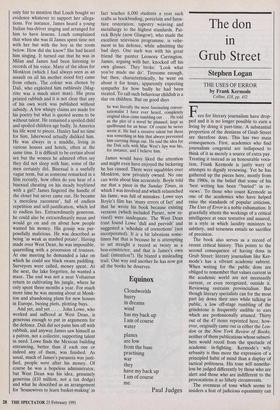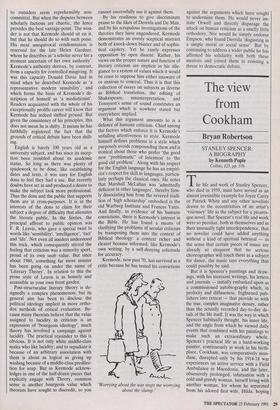The don in Grub Street
Stephen Logan
THE USES OF ERROR by Frank Kermode Collins, £18, pp. 432 Fees for literary journalism have drop- ped and it is no longer possible to earn a living by doing it part-time. A substantial proportion of the denizens of Grub Street are therefore dons. This has two main consequences. First, academics who find journalism congenial are indisposed to think of it as merely a source of extra pay. Treating it instead as an honourable voca- tion, Frank Kermode is justly wary of attempts to dignify reviewing. Yet he has gathered up the pieces here, mostly from the 1980s, in the belief that some of his 'best writing has been "buried" in re- views'. To those who count Kermode as one of the academics who have helped raise the standards of popular criticism, The Uses of Error is a noble exhumation. It gracefully attests the workings of a critical intelligence at once tentative and assured, in a style in which lucidity ministers to subtlety, and terseness entails no sacrifice of precision.
The book also serves as a record of recent critical history. This points to the second consequence of having dons in Grub Street: literary journalism like Ker- mode's has a vibrant academic subtext. When writing for the public dons are obliged to remember that values current in the academic world are not necessarily current, or even recognized, outside it. Reviewing restrains provincialism. But though literary specialists can for the most part lay down their axes while talking in public, a low off-stage rumbling of the grindstone is frequently audible to ears which are professionally attuned. Thirty Out of the 47 items reprinted here, how- ever, originally came out in either the Lon- don or the New York Review of Books, neither of them publications whose subscri- bers would recoil from the spectacle of academic in-fighting. Kermode's wily urbanity is thus more the expression of a principled habit of mind than a display of tactical politeness. His tone will nonethe- less be judged differently by those who are alert and those who are indifferent to the provocations it so lithely circumvents.
The evenness of tone which seems to insiders a feat of judicious equanimity can to outsiders seem reprehensibly non- committal. But when the disputes between scholarly factions are chaotic, the fence provides the best vantage-point. The won- der is not that Kermode should sit on it, but that he should do so with such poise. His most unequivocal condemnation is reserved for the late Helen Gardner, whom he describes as 'a scholar never for a moment uncertain of her own authority'. Kermode's authority derives, by contrast, from a capacity for controlled misgiving. It was this capacity Donald Davie had in mind when he described Kermode as 'a representative modern sensibility', and which forms the basis of Kermode's de- scription of himself as 'a mediationist'. Readers acquainted with the whole of his exceptionally prolific career will know that Kermode has indeed shifted ground. But given the consistency of his principles, this does not mean he is shifty. It means he has faithfully registered the fact that the grounds of critical debate have been shift- ing.
English is barely 100 years old as a university subject, and has since its incep- tion been troubled about its academic status. So long as there was plenty of spadework to be done, like establishing dates and texts, it was easy for English dons to feel they had a use. But recently doubts have set in and produced a desire to make the subject look more professional. Thus the dons and the public that supports them are at cross-purposes. It is in the interests of the dons to claim for their subject a degree of difficulty that alienates the literate public. In the Sixties, the principal affront to public opinion was F. R. Leavis, who gave a special twist to words like 'sensibility', 'intelligence', 'tact' and 'life'. Not even all insiders understood this trick, which consequently stirred the feeling that criticism was a minority sport, proud of its own snob value. But since about 1980, something far more sinister has been going on under the name of 'Literary Theory'. In relation to this the prose style of Leavis is as homely and accessible as your own front garden. Post-structuralist literary theory is de- signedly a complex phenomenon; but its general aim has been to disclose the political ideology implicit in more ortho- dox methods of critical evaluation. Be- cause many theorists believe that the value assigned to lucidity in criticism is an expression of 'bourgeois ideology', much theory has involved a campaign against lucidity. The practical rejoinder to this is obvious. It is not only white middle-class males who like lucidity; and to repudiate it because of an arbitrary association with them is about as logical as giving up washing because of a middle-class predilec- tion for soap. But as Kermode acknow- ledges in one of the half-dozen pieces that explicitly engage with Theory, common sense is another bourgeois value which theorists have sought to discredit, so you cannot successfully use it against them.
By his readiness to give discriminate praise to the likes of Derrida and De Man, and by his scrupulous investigations of the theories they have engendered, Kermode demonstrates an evenly sceptical mistrust both of knock-down bluster and of sophis- tical cajolery. Yet he rarely expresses opposition by open dissent. Rather, his views on the proper nature and function of literary criticism are implicit in his alle- giance to a system of values which it would be crass to suppose him either unaware of or anxious to conceal. Thus it is that this collection of essays on subjects as diverse as Biblical translation, the editing of Shakespeare, misinterpretation, and Tennyson's sense of sound constitutes an argument which is nowhere stated but everywhere implied.
What this argument amounts to is a defence of humane criticism. Chief among the factors which enforce it is Kermode's unfailing attentiveness to style. Kermode himself defines problems in a style which purposely avoids compounding them and is ironical about those who prefer 'the good new "problematic" of Intention' to 'the good old problem'. Along with his respect for the English language he has an empiri- cist's respect for skill in languages, particu- larly perhaps the classical ones. He notes that Marshall McLuhan was 'admittedly deficient in other languages', thereby firm- ly dissociating him from the revered tradi- tion of 'high scholarship' embodied in the old Warburg Institute and Frances Yates. And finally, as evidence of his humane convictions, there is Kermode's interest in the Bible. He has found a means of clarifying the problems of secular criticism by transposing them into the context of Biblical theology: a context richer and clearer because informed, like Kermode's own writing, by a self-denying solicitude for accuracy.
Kermode, now past 70, has survived as a critic because he has tested his convictions 'Worrying about the war stops me worrying. about the slump.' against the arguments which have sought to undermine them. He would never im- itate Orwell and directly disparage the attack on human criticism as a smelly little orthodoxy. Nor would he simply endorse Empson, who found Derrida 'disgusting in a simple moral or social sense'. But by continuing to address a wider public he has affirmed his solidarity with both these mentors and joined them in resisting a threat to democratic debate.



















































 Previous page
Previous page